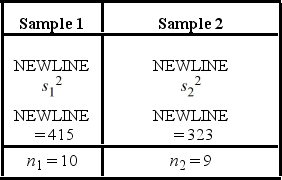The following are the competing hypotheses and the relevant summary statistics: Η0:  /
/  ≤ 1, ΗA:
≤ 1, ΗA:  /
/  > 1.
> 1.  The p-value associated with the value of the test statistic is 0.3692. At the 5% significance level, which of the following conclusions is correct?
The p-value associated with the value of the test statistic is 0.3692. At the 5% significance level, which of the following conclusions is correct?
A) We reject the null hypothesis and conclude the first variance is larger than the second.
B) We do not reject the null hypothesis and conclude the first variance is larger than the second.
C) We reject the null hypothesis and cannot conclude the first variance is larger than the second.
D) We do not reject the null hypothesis and cannot conclude the first variance is larger than the second.
Correct Answer:
Verified
Q65: Consider the expected returns (in percent) from
Q66: A financial analyst examines the performance of
Q67: The following are the competing hypotheses and
Q68: The following are the competing hypotheses and
Q69: Consider the expected returns (in percent) from
Q71: Consider the expected returns (in percent) from
Q72: Which of the following Excel's functions is
Q73: Amie Jackson, a manager at Sigma travel
Q74: A financial analyst examines the performance of
Q75: The result of placing a larger sample
Unlock this Answer For Free Now!
View this answer and more for free by performing one of the following actions

Scan the QR code to install the App and get 2 free unlocks

Unlock quizzes for free by uploading documents